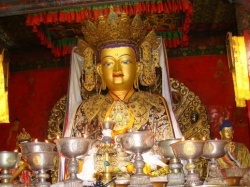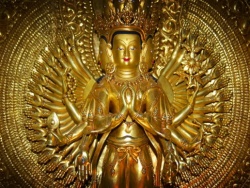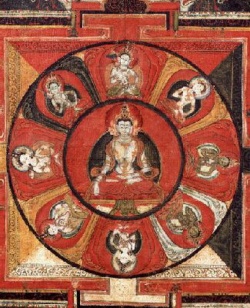Difference between revisions of "Garbhadhatu"
| Line 4: | Line 4: | ||
[[胎蔵界]] (Skt [[garbhadhatu]]; Jpn [[taizo-kai]] ) | [[胎蔵界]] (Skt [[garbhadhatu]]; Jpn [[taizo-kai]] ) | ||
[[File:Aaassion.jpg|thumb|250px|]] | [[File:Aaassion.jpg|thumb|250px|]] | ||
| − | Also, [[Womb World]]. A [[realm]] depicted in the [[Mahavairochana Sutra]], a principal [[scripture]] of [[Esoteric Buddhism]]. In this [[realm]], all [[compassionate]] [[actions]] leading to {{Wiki|salvation}} are depicted as being born of and sustained by the fundamental [[principle]] of the [[universe]], just as [[life]] is nurtured by and born from the [[womb]]. The [[Womb Realm]] thus represents the "[[repository of truth]]," or [[Dharma body]] of [[Mahavairochana Buddha]], that is considered the source of all [[compassion]]. This term contrasts with the [[Diamond Realm]], which represents the [[wisdom]] of [[Mahavairochana]]. The [[Womb Realm]] is represented graphically in [[Esoteric Buddhism]] by the [[Womb Realm mandala]]. [[Garbha]] of the [[Sanskrit]] [[name]] [[garbhadhatu]] means [[womb]], [[embryo]], or fetus, and [[dhatu]] means [[realm]], [[world]], or layer. | + | Also, [[Womb World]]. A [[realm]] depicted in the [[Mahavairochana Sutra]], a [[principal]] [[scripture]] of [[Esoteric Buddhism]]. In this [[realm]], all [[compassionate]] [[actions]] leading to {{Wiki|salvation}} are depicted as being born of and sustained by the fundamental [[principle]] of the [[universe]], just as [[life]] is nurtured by and born from the [[womb]]. The [[Womb Realm]] thus represents the "[[repository of truth]]," or [[Dharma body]] of [[Mahavairochana Buddha]], that is considered the source of all [[compassion]]. This term contrasts with the [[Diamond Realm]], which represents the [[wisdom]] of [[Mahavairochana]]. The [[Womb Realm]] is represented graphically in [[Esoteric Buddhism]] by the [[Womb Realm mandala]]. [[Garbha]] of the [[Sanskrit]] [[name]] [[garbhadhatu]] means [[womb]], [[embryo]], or {{Wiki|fetus}}, and [[dhatu]] means [[realm]], [[world]], or layer. |
[[File:&cv .jpg|thumb|250px|]] | [[File:&cv .jpg|thumb|250px|]] | ||
| − | Additionally , being influenced by the tantora of [[Shakta]] [[Hinduism]] and [[Shakti]] [[belief]] , [[Anunttara-yoga]] was seen characteristically in the late-stage [[Mikkyo]] , which was a training of coalescence ( {{Wiki|sex}} ) between {{Wiki|male}} {{Wiki|principles}} ( [[mind]] , [[wisdom]] , [[upaya]] and [[Vajradhatu]] ) and {{Wiki|female}} {{Wiki|principles}} ( [[body]] , [[feeling]] , [[Hannya]] and [[Garbhadhatu]] ) , so that there appeared [[joyful]] [[Buddha]] ( [[歓喜仏]] ) which showed that the {{Wiki|male}} [[Buddha]] ( {{Wiki|male}} [[principle]] ) and {{Wiki|female}} [[Buddha]] ( {{Wiki|female}} [[principle]] ) had {{Wiki|sexual}} intercourse . | + | Additionally , being influenced by the tantora of [[Shakta]] [[Hinduism]] and [[Shakti]] [[belief]] , [[Anunttara-yoga]] was seen characteristically in the late-stage [[Mikkyo]] , which was a {{Wiki|training}} of coalescence ( {{Wiki|sex}} ) between {{Wiki|male}} {{Wiki|principles}} ( [[mind]] , [[wisdom]] , [[upaya]] and [[Vajradhatu]] ) and {{Wiki|female}} {{Wiki|principles}} ( [[body]] , [[feeling]] , [[Hannya]] and [[Garbhadhatu]] ) , so that there appeared [[joyful]] [[Buddha]] ( [[歓喜仏]] ) which showed that the {{Wiki|male}} [[Buddha]] ( {{Wiki|male}} [[principle]] ) and {{Wiki|female}} [[Buddha]] ( {{Wiki|female}} [[principle]] ) had {{Wiki|sexual}} intercourse . |
There is a case that four [[Bosatsu]] in the ' [[Chudaihachiyoin]] ' ( the [[central eight-Petal Cour]]t ) at the center of the ' [[Garbhadhatu Mandala]] ' of the [[Esoteric Buddhism]] , [[Fugen Bosatsu]] . [[Monju Bosatsu]] , [[Kannon Bosatsu]] and [[Miroko Bosatsu]] are together called the [[shibosatsu]] . | There is a case that four [[Bosatsu]] in the ' [[Chudaihachiyoin]] ' ( the [[central eight-Petal Cour]]t ) at the center of the ' [[Garbhadhatu Mandala]] ' of the [[Esoteric Buddhism]] , [[Fugen Bosatsu]] . [[Monju Bosatsu]] , [[Kannon Bosatsu]] and [[Miroko Bosatsu]] are together called the [[shibosatsu]] . | ||
| Line 14: | Line 14: | ||
The [[symbolic]] gesture with the fingers of [[Vajradhatu]] [[Dainichinyorai]] is [[Chiken-in]] ( the [[knowledge-fist mudra]] ) , and that of [[Garbhadhatu]] [[Dainichinyorai]] is Hokkai Join ( the [[Dharma-realm]] [[meditation mudra]] ) . | The [[symbolic]] gesture with the fingers of [[Vajradhatu]] [[Dainichinyorai]] is [[Chiken-in]] ( the [[knowledge-fist mudra]] ) , and that of [[Garbhadhatu]] [[Dainichinyorai]] is Hokkai Join ( the [[Dharma-realm]] [[meditation mudra]] ) . | ||
| − | The sitting statue of [[Nyoirin Kannon]] ( important {{Wiki|cultural}} property ) is enshrined in Zushi placed in the center of the hall , and in front of it , [[Ryokai mandala]] ( [[Mandalas]] of the [[two Realms]] ) : [[Vajradhatu Mandala]] and [[Garbhadhatu Mandala]] hang on either side of the wall facing each other . | + | The sitting statue of [[Nyoirin Kannon]] ( important {{Wiki|cultural}} property ) is enshrined in [[Zushi]] placed in the center of the hall , and in front of it , [[Ryokai mandala]] ( [[Mandalas]] of the [[two Realms]] ) : [[Vajradhatu Mandala]] and [[Garbhadhatu Mandala]] hang on either side of the wall facing each other . |
He took over the [[Mikkyo]] of [[Vajradhatu]] and [[Garbhadhatu]] . | He took over the [[Mikkyo]] of [[Vajradhatu]] and [[Garbhadhatu]] . | ||
| − | In [[Vajrayana Buddhism]], the [[Womb Realm]] (Skt. [[garbhakosa-dhatu]], [[Japanese]]: [[胎蔵界]] [[taizōkai]]) is the [[metaphysical]] [[space]] inhabited by the [[Five Wisdom Kings]]. The [[Womb Realm]] is based on the [[Mahāvairocana Sutra]]. The [[name]] of the [[mandala]] derives from chapter 2 of the [[sutra]], where it is said that [[Mahāvairocana Buddha]] revealed the [[mandala's]] secret teachings to his [[disciple]] [[Vajrasattva]] from his "[[womb of compassion]]". In other translations, the term {{Wiki|matrix}} [[realm]] or {{Wiki|Matrix}} [[Mandala]] are used.[2] | + | In [[Vajrayana Buddhism]], the [[Womb Realm]] (Skt. [[garbhakosa-dhatu]], [[Japanese]]: [[胎蔵界]] [[taizōkai]]) is the [[metaphysical]] [[space]] inhabited by the [[Five Wisdom Kings]]. The [[Womb Realm]] is based on the [[Mahāvairocana Sutra]]. The [[name]] of the [[mandala]] derives from [[chapter]] 2 of the [[sutra]], where it is said that [[Mahāvairocana Buddha]] revealed the [[mandala's]] [[secret teachings]] to his [[disciple]] [[Vajrasattva]] from his "[[womb of compassion]]". In other translations, the term {{Wiki|matrix}} [[realm]] or {{Wiki|Matrix}} [[Mandala]] are used.[2] |
| − | The [[Womb Realm]] is a very popular [[subject]] for [[mandalas]], and along with the [[Diamond Realm]] ([[vajradhatu]]) [[Mandala]] [[forms]] the [[Mandala of the Two Realms]]. This [[mandala]], along with the [[Diamond Realm]], [[form]] the core of [[Japanese]] [[Shingon]] and [[Tendai]] [[Buddhist]] [[rituals]], including the [[initiation]] or [[abhiseka]] [[ritual]]. In this [[ritual]], new initiates are blindfolded and asked to toss a [[flower]] upon a [[mandala]]. Where the [[flower]] lands helps decide which [[Buddhist]] figure the student should devote themselves to.[3] | + | The [[Womb Realm]] is a very popular [[subject]] for [[mandalas]], and along with the [[Diamond Realm]] ([[vajradhatu]]) [[Mandala]] [[forms]] the [[Mandala of the Two Realms]]. This [[mandala]], along with the [[Diamond Realm]], [[form]] the core of [[Japanese]] [[Shingon]] and [[Tendai]] [[Buddhist]] [[rituals]], [[including]] the [[initiation]] or [[abhiseka]] [[ritual]]. In this [[ritual]], new [[initiates]] are blindfolded and asked to toss a [[flower]] upon a [[mandala]]. Where the [[flower]] lands helps decide which [[Buddhist]] figure the [[student]] should devote themselves to.[3] |
In [[traditional]] [[Shingon]] halls, the [[Womb Realm Mandala]] is hung on the [[east]] wall, [[symbolizing]] the young stage of [[Mahāvairocana]] [[Buddha]]. In this setting, the [[Diamond Realm Mandala]] is hung on the [[west]] wall [[symbolizing]] the final [[realization]] of [[Mahāvairocana]] [[Buddha]]. | In [[traditional]] [[Shingon]] halls, the [[Womb Realm Mandala]] is hung on the [[east]] wall, [[symbolizing]] the young stage of [[Mahāvairocana]] [[Buddha]]. In this setting, the [[Diamond Realm Mandala]] is hung on the [[west]] wall [[symbolizing]] the final [[realization]] of [[Mahāvairocana]] [[Buddha]]. | ||
Revision as of 08:28, 21 March 2016
Womb Realm
胎蔵界 (Skt garbhadhatu; Jpn taizo-kai )
Also, Womb World. A realm depicted in the Mahavairochana Sutra, a principal scripture of Esoteric Buddhism. In this realm, all compassionate actions leading to salvation are depicted as being born of and sustained by the fundamental principle of the universe, just as life is nurtured by and born from the womb. The Womb Realm thus represents the "repository of truth," or Dharma body of Mahavairochana Buddha, that is considered the source of all compassion. This term contrasts with the Diamond Realm, which represents the wisdom of Mahavairochana. The Womb Realm is represented graphically in Esoteric Buddhism by the Womb Realm mandala. Garbha of the Sanskrit name garbhadhatu means womb, embryo, or fetus, and dhatu means realm, world, or layer.
Additionally , being influenced by the tantora of Shakta Hinduism and Shakti belief , Anunttara-yoga was seen characteristically in the late-stage Mikkyo , which was a training of coalescence ( sex ) between male principles ( mind , wisdom , upaya and Vajradhatu ) and female principles ( body , feeling , Hannya and Garbhadhatu ) , so that there appeared joyful Buddha ( 歓喜仏 ) which showed that the male Buddha ( male principle ) and female Buddha ( female principle ) had sexual intercourse .
There is a case that four Bosatsu in the ' Chudaihachiyoin ' ( the central eight-Petal Court ) at the center of the ' Garbhadhatu Mandala ' of the Esoteric Buddhism , Fugen Bosatsu . Monju Bosatsu , Kannon Bosatsu and Miroko Bosatsu are together called the shibosatsu .
Kobo-daishi was given both Vajradhatu and Garbhadhatu from Keika Ajari , and he founded Shingon Mikkyo by conveying them .
The symbolic gesture with the fingers of Vajradhatu Dainichinyorai is Chiken-in ( the knowledge-fist mudra ) , and that of Garbhadhatu Dainichinyorai is Hokkai Join ( the Dharma-realm meditation mudra ) .
The sitting statue of Nyoirin Kannon ( important cultural property ) is enshrined in Zushi placed in the center of the hall , and in front of it , Ryokai mandala ( Mandalas of the two Realms ) : Vajradhatu Mandala and Garbhadhatu Mandala hang on either side of the wall facing each other .
He took over the Mikkyo of Vajradhatu and Garbhadhatu .
In Vajrayana Buddhism, the Womb Realm (Skt. garbhakosa-dhatu, Japanese: 胎蔵界 taizōkai) is the metaphysical space inhabited by the Five Wisdom Kings. The Womb Realm is based on the Mahāvairocana Sutra. The name of the mandala derives from chapter 2 of the sutra, where it is said that Mahāvairocana Buddha revealed the mandala's secret teachings to his disciple Vajrasattva from his "womb of compassion". In other translations, the term matrix realm or Matrix Mandala are used.[2]
The Womb Realm is a very popular subject for mandalas, and along with the Diamond Realm (vajradhatu) Mandala forms the Mandala of the Two Realms. This mandala, along with the Diamond Realm, form the core of Japanese Shingon and Tendai Buddhist rituals, including the initiation or abhiseka ritual. In this ritual, new initiates are blindfolded and asked to toss a flower upon a mandala. Where the flower lands helps decide which Buddhist figure the student should devote themselves to.[3]
In traditional Shingon halls, the Womb Realm Mandala is hung on the east wall, symbolizing the young stage of Mahāvairocana Buddha. In this setting, the Diamond Realm Mandala is hung on the west wall symbolizing the final realization of Mahāvairocana Buddha.


